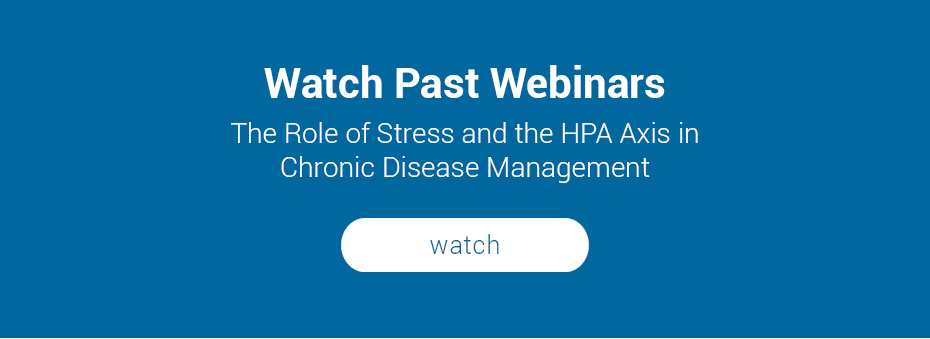Sometimes, when we endeavor to understand and describe complicated medical topics, there is a temptation to find a simple explanation to cut through that complexity. Sometimes these simple explanations can help bridge the knowledge gap for a while, but as our knowledge grows, those explanations lose some of their original usefulness (i.e., “good” and “bad” cholesterol). In many cases, those oversimplified explanations actually become a hindrance to helping clinicians and patients understand the important mechanisms and solutions related to their chronic conditions.
The use of terms like “adrenal fatigue,” and “adrenal exhaustion” to summarize the complex dysfunctions related to the stress-response is one such explanation. Though these terms may help dispel the notion that only extreme issues related to adrenal function (Addison’s or Cushing’s Disease) are of clinical importance, these terms are now ubiquitous within the functional and integrative medical community as a diagnosis or explanation for stress-related chronic dysfunction. These terms should be abandoned and replaced by more accurate and medically appropriate terms (described below) in order to focus attention on the primary etiology of stress-related chronic dysfunction, which is controlled by the brain rather than the adrenal gland.?
In recent years, the broader medical community (led primarily by the Endocrine Society) has targeted “adrenal fatigue” as a diagnostic myth and warned consumers about practitioners who use this term.?,?,? Ironically, with the exception of publications criticizing the term, the language “adrenal fatigue” is rarely used in peer-reviewed published literature. However, the term is widely embraced by many clinicians (and the public) as the primary root cause (or consequence) for stress-related chronic dysfunction. The idea that chronic stress exhausts the capacity of the adrenal glands to produce cortisol (like the pancreas is exhausted to produce insulin in type 2 diabetes) is what drives this phenomenon. The common finding of low cortisol levels (most often using salivary cortisol testing) in subjects complaining of chronic stress is often cited as evidence of “adrenal fatigue.”
While it is true that the most common laboratory tests used to assess the function of the HPA axis is the measurement of hormones secreted by the adrenal glands, primarily cortisol and DHEA(S), the mechanisms that control the level of these hormones resides mostly outside of the adrenal gland (in the brain, see The Role of Stress and the HPA Axis in Chronic Disease Management Road Map). Low cortisol and/or DHEA levels may indeed be related to chronic stress, but the root cause leading to reduced levels of these hormones is related to HPA axis adaption (down-regulation), perhaps to intentionally protect sensitive tissues from excess cortisol, and have nothing to do with the intrinsic cortisol-producing capacity of a person’s adrenal glands.? Therefore, while many clinicians (and laboratories) refer to this as “adrenal testing,” it is much more accurate to say that such tests assess the status of the HPA axis using adrenal hormone measurements as surrogate markers, and this is only true if those test samples are collected in the appropriate manner and time (see testing section in the Road Map).
We advocate that clinicians change their nomenclature related to stress-induced phenomena away from language that focuses on “adrenals” and, instead, focuses on stress or the stress-response (i.e., the HPA axis). Using descriptive and accurate terms helps clinicians and patients have a better understanding of the pathophysiology caused by stress and the stress-response system. Also, since most stress-related phenomena start with one of several key hypothalamic triggers such as perceived stress, glycemic dysregulation, inflammatory signaling, circadian disruption or feedback inhibition issues (in the hypothalamus and/or pituitary), successful treatment protocols are much more likely to address these root issues rather than therapies designed to support the adrenal glands.
The term HPA axis dysfunction (or HPA axis maladaption) is much more appropriate to describe the typical consequences that link stress with the myriad of measurable negative consequences related to the stress-response; the majority of which can be linked in some manner to processes controlled by the HPA axis. Alternatively, some refer to these as “disorders of the stress response system” or the consequences of the maladaption to stress. Again, most of these terms are used, in various ways, by stress researchers in the peer-reviewed literature and help orient both clinician and patient to the role of stressors and the stress response as two modifiable components of therapy. By avoiding the use of oversimplified (and incorrect) terminology to describe these relationships and, instead, choosing more appropriate descriptive terms, the clinician will enhance the credibility of these important relationships and be better equipped to incorporate therapies that address the complexity of the whole stress response system.
? While we generally agree with the Endocrine Society that the term “adrenal fatigue” is problematic, we do not agree with them that there is little evidence to connect chronic stress with adverse health outcomes, or that testing adrenal hormone output is of no value beyond diagnosing extreme adrenal disease conditions. Their public statement can be found here: www.hormone.org/hormones-and-health/myth-vs-fact/adrenal-fatigue
? Ross IL, Jones J, Blockman M. We are tired of 'adrenal fatigue'. S Afr Med J. 2018 Aug 28;108(9):724-725.
? Cadegiani FA, Kater CE. Adrenal fatigue does not exist: a systematic review. BMC Endocr Disord. 2016 Aug 24;16(1):48.
? Fries E, Hesse J, Hellhammer J, Hellhammer DH. A new view on hypocortisolism. Psychoneuroendocrinology. 2005 Nov;30(10):1010-6.

Dr. Guilliams earned his doctorate from the Medical College of Wisconsin (Milwaukee) where he studied molecular immunology in the Microbiology Department. Since 1996, he has spent his time studying the mechanisms and actions of natural-based therapies, and is an expert in the therapeutic uses of nutritional supplements.
As the Vice President of Scientific Affairs for Ortho Molecular Products, he has developed a wide array of products and programs which allow clinicians to use nutritional supplements and lifestyle interventions as safe, evidence-based and effective tools for a variety of patients. Tom teaches at the University of Wisconsin-School of Pharmacy, where he holds an appointment as a Clinical Instructor; at the University of Minnesota School of Pharmacy and is a faculty member of the Fellowship in Anti-aging Regenerative and Functional Medicine. He lives outside of Stevens Point, Wisconsin with his wife and children.




